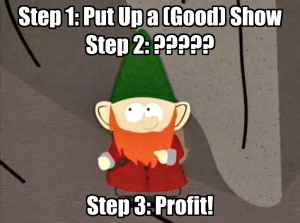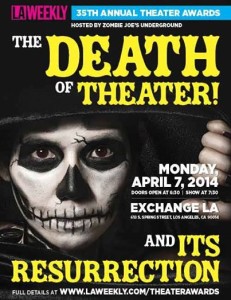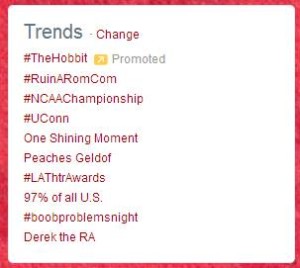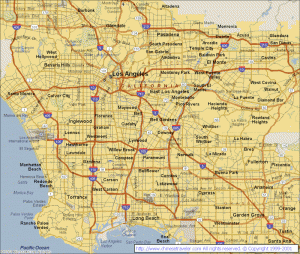How Tweet It Is
Attention Must Be Paid (to Social Media)
On April 8, 2014, at 12:06 a.m., on the heels of the L.A. Weekly Theater Awards, a small group of LA theater folk (three of us, to be precise, plus a few unwitting helpers) accomplished something. For a brief, shining moment lasting approximately half an hour, the LA Theater signal pierced the veil. #LAThtrAwards trended.
Take a second. I’ll let you steep in that for a moment.
Okay. Okay. I know. I can hear you asking already, “So what? What’s the big deal? You got a hashtag to trend for a few minutes. So-frickin’-what? Who cares?”
Well, if you’re reading this, you care. Or rather, you should. Here’s why.
Los Angeles has a vibrant, thriving theater community. There’s great work going on, and lots of it. Dozens and dozens of companies mount full seasons in houses of all sizes: old plays, new plays, red plays, blue plays, plays of all shapes and styles. On any given weekend, there’s somewhere between 50 and over 100 productions going on throughout the Southland. In my neighborhood of North Hollywood alone, there are more theaters per square block than anywhere else in the country, save New York.
So, why, then, do we find ourselves trapped inside The FishbowlTM. Perhaps you call it “The Echo Chamber.” Maybe, in your mind, our theater is not of a place, but of a habit, one where we as a community keep passing the same $20 bill around to one another as we see each other’s work or fund each other’s Kickstarters. There’s a prevalent notion that the only people going to see theater regularly in this town are other theater people.
Now, I don’t think that’s entirely true, but I do know that I can’t sell out 18 performances over six weeks in my own theater of only 40-seats. In a city with 3.85 million people, that’s shameful. But it’s true, and personally, I think it’s because we, as a community, have failed to break into our city’s greater collective consciousness.
Simply put, a very large percentage of L.A.’s population has no idea we even exist. And those who do haven’t been given a good enough reason to care about us . . . yet.
Recently, in March, 2014, I was approached by someone who had a plan to change that. A Facebook message popped up inviting me to coffee on Saturday. Also invited was my recent acquaintance Thomas Bigley, Associate Producer at the Porters of Hellsgate. Our host was Kevin Delin; playwright, columnist for Bitter Lemons, and all-around rabble-rouser, and he had an idea.
We met, Mission: Impossible-style, in the back of a coffee shop in NoHo. Kevin’s pitch was simple: Find a crack in The FishbowlTM and break through it. His plan was detailed, but simple, with three basic objectives:
1) To have the hashtag #LAThtrAwards trend worldwide.
2) To have people follow any and all Twitter accounts associated with LA theater.
3) To start turning LA theater actors and companies into recognizable brand names.
I know, I know. You want to know what’s the big deal about a trending hashtag?
Well first, consider this: Los Angeles boasts the sixth largest population of Twitter users in the world. That’s a lot of potential audiences. The more you tweet, the more other Twitter users will find you and follow you. This is great for theater companies and artists because it exposes more people to our work and potentially translates into larger audiences.
Now, trending hashtags reflect important events and occurrences that are happening right now that a lot of people are talking about or interested in, something important that @JoeTwitteruser should look at immediately, and it provides him a way to not only jump right into the middle of the conversation, but also identify who the major players are (see #3 above) and connect with them directly (see #2). It can increase the garden-hose flow of conversation about theater in L.A. into that of a water main.
Need a non-theater example? Check out #RedSox during a game. Or the hashtag for your favorite television show when a new episode is on. Or the #Oscars.
Back to the story. Tom and I signed on. We had a lot of work to do. Our target event was the LA Weekly Theater Awards, being held at Exchange L.A., downtown on April 7. The irony was, none of us could actually be at the award show. But the beauty of the Internet is that we didn’t have to be there to participate. In fact, it was advantageous that we weren’t.
An associate registered the @LAThtrAwards handle. They planned on running the account night-of, and providing general coverage throughout the evening. Bitter Lemons’s editor Colin Mitchell gave us an assist by putting up a tweet-box for the hashtag on the front page of his website. Thomas and I engaged the ground-troops in our respective circles – folks we knew would be at the Awards and could provide their unique first-person perspectives via Twitter. That’s when we hit our first bump, and it was a shocker.
LA Theatre folk talk a lot about cooperation. They talk a lot about wanting to break through The FishbowlTM and reach out to populations beyond it.
But when it came to getting our own community to jump on board with this, I was surprised by the amount of apathy.
“What’s the point?” one very influential and respected LA theatre person asked me over drinks in the dimly-lit back room of a Hollywood dive bar. “It’s not going to do anything.”
That sentiment was echoed by several others I approached, and honestly, I was disappointed. I had expected better.
Sure, getting a hashtag trending would be no magic bullet; it was supposed to be just a first step in reaching out and changing perceptions.
If we wanted our work, our art, our passion to catch the collective eye of our city, we needed a stronger, sustained and more organized stream of interactions and data showing to all of Los Angeles exactly what our community had been doing, right under their noses. So we left the nay-sayers behind, and marched on.
A few foot soldiers agreed to help cover the action that night from inside Exchange L.A.. Plus, I had a secret weapon – a social media dashboard through which I could run five different Twitter accounts all attached to my name.
The day of the show, a couple of casual tweets were posted back and forth amongst the people “in the know” using our hashtag. That was the warm-up. That evening, I sat down in my theater in NoHo, where I was supervising auditions for an upcoming production, with my laptop fired up and tethered to my phone for Internet service. Then, the fun began.
Our team began firing tweets off, trying to reach others who were there at the event, in the room. We were asking questions, throwing up shout-outs to friends, offering congratulations to nominees, etc. This is where we hit the second bump in the road.
Apparently, nobody on Verizon’s network could get a signal in the venue. Awesome. There went 90% of our people on the inside. That’s fine though, because we were determined to make it work, even if it meant that I had to tweet back-and-forth with myself using two different accounts.
We were also lucky. The social media manager for Zombie Joe’s Underground had a signal, and since they were hosting the event, they were tweeting it like nobody’s business. Our crew latched on to them, and we were all off to the races.
I tweeted furiously between auditioning actors, popping back-and-forth between the five different account tabs in my dashboard like a game of frenzied whack-a-mole. “That was great! Thank you for coming.” Tweet-Reply-Favorite-Retweet. Tweet-Reply-Favorite-Retweet. “Next actor, please.” Repeat ad nauseum.
The team at Zombie Joe’s Underground provided pictures and a running commentary of the events. We provided the cheering section. Over time, others began to interact and get in on the action. Suddenly, I wasn’t talking to myself anymore. As it turns out, that was a good thing because my batteries gave out, both on my laptop and on my phone. Being in the middle of auditions, there was no place convenient for me to plug in to recharge. I was out of the game.
I got home late that night, plugged in and messaged the rest of the team to find out what I’d missed. Kevin had some early statistics back: 1.34 million impressions of the #LAThtrAwards hashtag. Impressive, especially considering that we’d achieved that with only about a dozen accounts using the one hashtag regularly throughout the night, and none of them had more than a couple thousand followers. Of that list, our team made up the majority.
We sat and talked for a little bit about what worked and what didn’t. Turns out, as the revelers inside Exchange L.A. who’d been blocked by the Verizon blackout were leaving the event, they popped back on the grid (mostly to complain about the lack of signal in the venue). At 12:06 AM, I logged on to my personal account to see if people were still tweeting on the hashtag. That’s when I saw it.
We’d done it, and with only about a dozen hardcore Tweeps using the tag regularly throughout the night. And you know what? It was pretty easy. But that’s not the most mind-blowing part.
No, the most mind-blowing part was who we managed to it without: No Stage Raw. No LA Stage Alliance. No LADCC. No Bitter Lemons (and Colin was there!) Here’s proof!

Even some of LA Theater’s biggest influencers only tweeted a handful of times. But most disappointing was the anemic coverage from the LA Weekly themselves. They contributed a total of three tweets during the event. Three. That’s basically nothing, when it’s your own awards show.
If a handful of us could crack The FishbowlTM, a whole community working together can shatter it. So, with that in mind, I offer the community a challenge:
The Hollywood Fringe Festival opens next month. It has its own hashtag. #HFF14. Learn it, love it, tweet it. The Hollywood Fringe Awards are June 29th. The #LAThtrAwards hashtag will be used again that night. I want to make that hashtag trend again (and #HFF14 while we’re at it). Let’s take another run at Kevin’s tri-fold plan and see what it gets us, this time with more people behind it.
If we could generate 1.68 million impressions of the #LAThtrAwards hashtag recorded during the L.A. Weekly Theater Awards and immediately after it, generated by about a dozen Twitter accounts, imagine the results can we get when there’s a hundred Tweeps singing the same bird song at the same time? What kind of attention can that garner us across the city?
Finally, I specifically call out LA Stage Alliance, Stage Raw, the LADCC, Bitter Lemons, LA Weekly, Backstage, and the LA Times (yeah, I’m talkin’ to you, Mr. McNulty): Cover the Fringe and its awards, even if it just means you’re sending an intern with a smartphone. Have them post a pic and a tweet announcing each winner, using the hashtags. Let’s see what happens. There’s a cultural movement happening right under your noses. You guys struggle just as much as we do for an audience. The key is to be there when things happen, and to be the relevant, authoritative voice. You have the opportunity to do that now.
Let’s work together and make it happen.
Gregory Crafts is a playwright, producer, and Managing Director of Theatre Unleashed.









